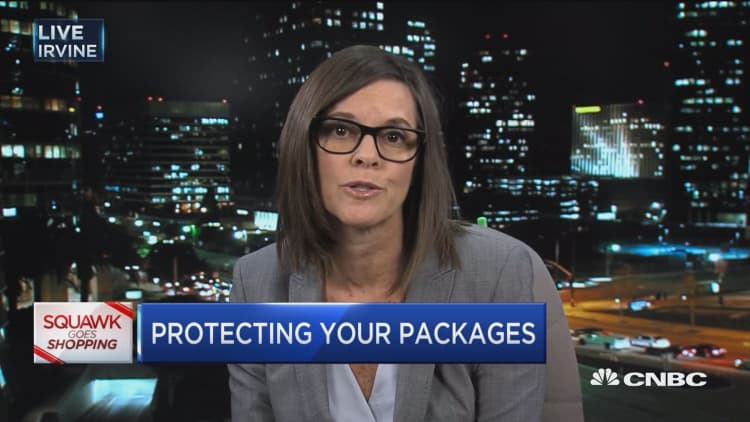
You're not the only person eagerly anticipating the arrival of your online shopping haul this holiday season.
Nearly 1 in 5 U.S. homeowners has been a victim of package theft in the last year, according to a recent survey by Ring, a home security firm. Ring surveyed 1,000 adults in October and November.
Package theft is even more prevalent during "the most wonderful time of the year," the company found — in large part, because there are more packages up for grabs.
Throughout the year, half of homeowners report receiving at least one package per week, but two-thirds say that number ticks up around the holidays. Between Black Friday and New Year's last year, the average homeowner had nine packages delivered.
It's likely they'll be expecting even more this year. Shoppers' online spending is poised to exceed in-store spending for the first time, with 51 percent of their budget going to web purchases and 42 percent to bricks-and-mortar stores, according to Deloitte's annual retail survey.
The holiday boost in e-commerce isn't the only factor behind the increase of package theft, said Jamie Siminoff, inventor and founder of Ring.
"You also have this opioid crisis that's happening, that's driving people to get small amounts of money out of desperation," he said.
The White House has declared the opioid epidemic a national public health emergency. Some of the communities hit hardest by this fatal outbreak are in rural America — in 2015, the overdose death rate for rural areas surpassed that of urban or suburban areas.
And the neighborhoods that most frequently face porch pirates? Also rural, according to an October study by Blink. The video security company found that residents in North Dakota, Vermont and Alaska were most likely to fall victim.
"If a package is sitting there by itself in a rural area, there's not as many people around to see it," said David Laubner, Blink's head of digital marketing and e-commerce.
Stolen packages can be an expensive loss: Last year, the median value of a stolen package was about $250, according to Ring. Although retailers may reimburse victims or replace hijacked goods (see tips below), keep in mind that some gifts don't come with that kind of guarantee.
"The real problem is when friends or a family member send you something not insured," Siminoff said. "Those [packages] are the ones you have to be most careful with."
So how, exactly, can you outsmart doorstep Grinches? Follow these simple steps:
Reroute your package
Think about having your goods delivered to a more secure location such as your office, a local UPS store or an Amazon Locker. If rerouting isn't an option, Laubner recommends requiring a signature upon delivery. This way, you're sure to be first to your package.
Leave delivery instructions
Place a note for your delivery person to let them know where to leave your parcel — anywhere from the back door to behind a plant on your porch. "Out of sight, out of mind," said Laubner.
Advertise a security system
Place security stickers and yard signs in strategic areas. That can catch the attention of burglars and make them think twice about targeting you.
Enlist a neighbor
If you're expecting a package while you're on vacation or otherwise away from home, ask a neighbor to hold it for you.
What to do if you're victimized
Contact the online retailer and explain the situation. Depending on the company, you could qualify for a refund or new shipment. "Most packages, especially from Amazon, are typically insured from the person you're buying it from," said Siminoff.
Your credit card issuer might also offer purchase protection. This may reimburse you for a stolen item, depending on the goods purchased, price and how recently you bought it.


